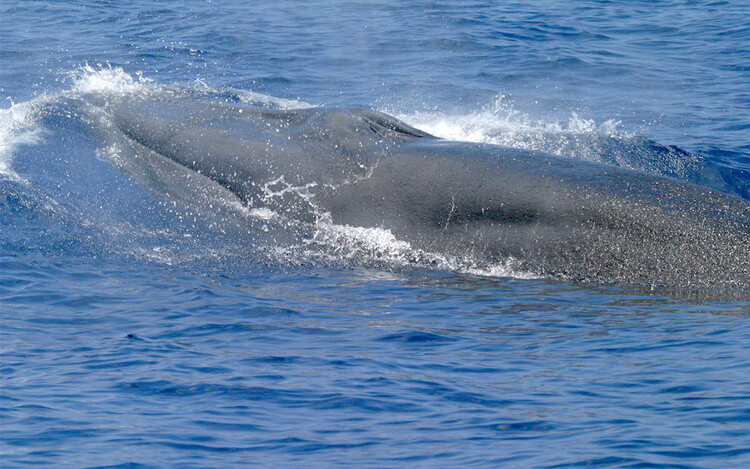The federal proposal to designate critical habitat for the endangered Rice’s whale is slowing amid opposition from Gulf of Mexico state leaders, who say any potential restrictions to protect the whales could endanger their maritime industries.
With a population estimated at only around 75 animals, the Rice’s whale is at even more peril than the North Atlantic right whale, believed to number around 360 whales ranging along the U.S. Atlantic coast.
Back in October 2023 the National Oceanic and Atmospheric Administration backed off from a rule proposal that called for local 10-knot speed limits when Rice’s whales are seen in Gulf waters. The agency says ship strikes are a major danger for whales just below the sea surface.
That plan drew intense criticism from Gulf shipping and offshore energy industries. The NOAA Fisheries service is continuing to push for some measures to help the Rice’s whale survive, by designating a 28,000-square mile critical habitat along the continental shelf and slope waters within the Gulf of Mexico.
The habitat designation would not immediately bring on additional protective measures but would require federal agencies to consider the Rice’s whale when reviewing development proposals.
That alone is enough to raise continued objections from Gulf state legislators.
NOAA and the Department of Interior “have actively pursued unnecessary measures for the Rice’s whale at the expense of communities along the Gulf of Mexico,” the U.S. senators for Louisiana and Alabama wrote in a May 1 letter to the agencies’ leaders.
“While we appreciate that NOAA denied the petition to establish vessel speed measures in the Gulf and that BOEM removed Rice’s whale stipulations from Lease Sale 261, we strongly urge that NOAA, NMFS, and BOEM refrain from advancing regulations that lack sound scientific backing,” wrote Sens. Bill Cassidy and John Kennedy, R-La., and Sens. Tommy Tuberville and Katie Boyd Britt, R-Ala.
The senators pointed to NOAA’s own admission that the “precision of all estimates is poor.”
“While NOAA and BOEM’s data is incomplete, we do have a robust understanding of the economic impact of the Gulf of Mexico,” the letter added. “In Texas, the Port of Houston generated $439 billion in statewide economic value in 2022. Ports across the state of Louisiana generated $182 billion in statewide economic impact, which includes nine ports located directly on the coast.”
“In Alabama, the Port of Mobile generated more than $85 billion in total economic activity in 2021. Imposing restrictions on development in the Gulf of Mexico would directly harm the economic activity and jobs across coastal communities.”
Off the East Coast, NOAA is still considering a rule change that would extend seasonal 10-knot speed limits in right whale areas to cover vessels between 35’ and 65’. In the House of Representatives, Rep. Buddy Carter, R-Ga., is sponsoring bill H.R. 8704, which would lock in NOAA’s current 2008 speed rule applying only to larger vessels.
“We need to protect the right whales, but we have to balance that with public safety and the needs of our coastal shipping economy,” Carter said in a June 28 hearing of the House Committee on Natural Resources. “Unfortunately, if this rule goes into effect, boaters who use 35' or larger vessels will simply not take fishing trips and the market will die for these kinds of vessels.”
“That’s why the rule threatens 27,000 direct and indirect jobs in Georgia related to recreational fishing and boating,” said Carter.
“The Port of Savannah is the single largest and fastest-growing container terminal in America in addition to being the second largest port on the East Coast by volume,” he added. “Their success has translated into growth and prosperity throughout the region, and this rule directly jeopardizes that.”
“NOAA's proposal was not well thought out and would have the unintended consequences of endangering pilots and pilot boat crews, raising the likelihood of marine accidents in the entrance channels of East Coast ports, and negatively impacting the maritime supply chain that is relied upon by all Americans,” testified Clay Diamond, executive director of the American Pilots’ Association. Carter’s legislation ‘would eliminate these risks by forcing NOAA to modernize its approach to its conservation efforts by focusing more on technology-based solutions,” Diamond told the committee.
“Vessel strikes in U.S. waters continue to injure and kill these whales at grossly unsustainable levels, including four mortalities this year alone,” said Dan Moss of the group Defenders of Wildlife. “By blocking science-based improvements to the vessel speed rule, this bill effectively issues a death warrant to this critically endangered species.”





